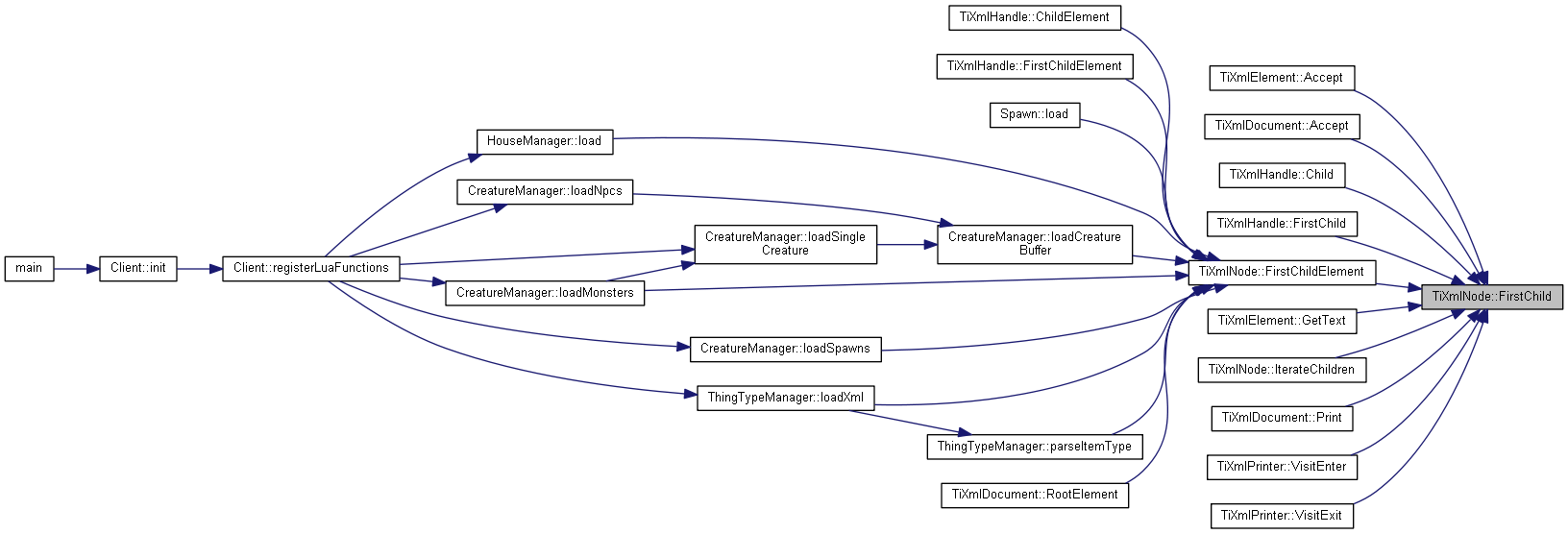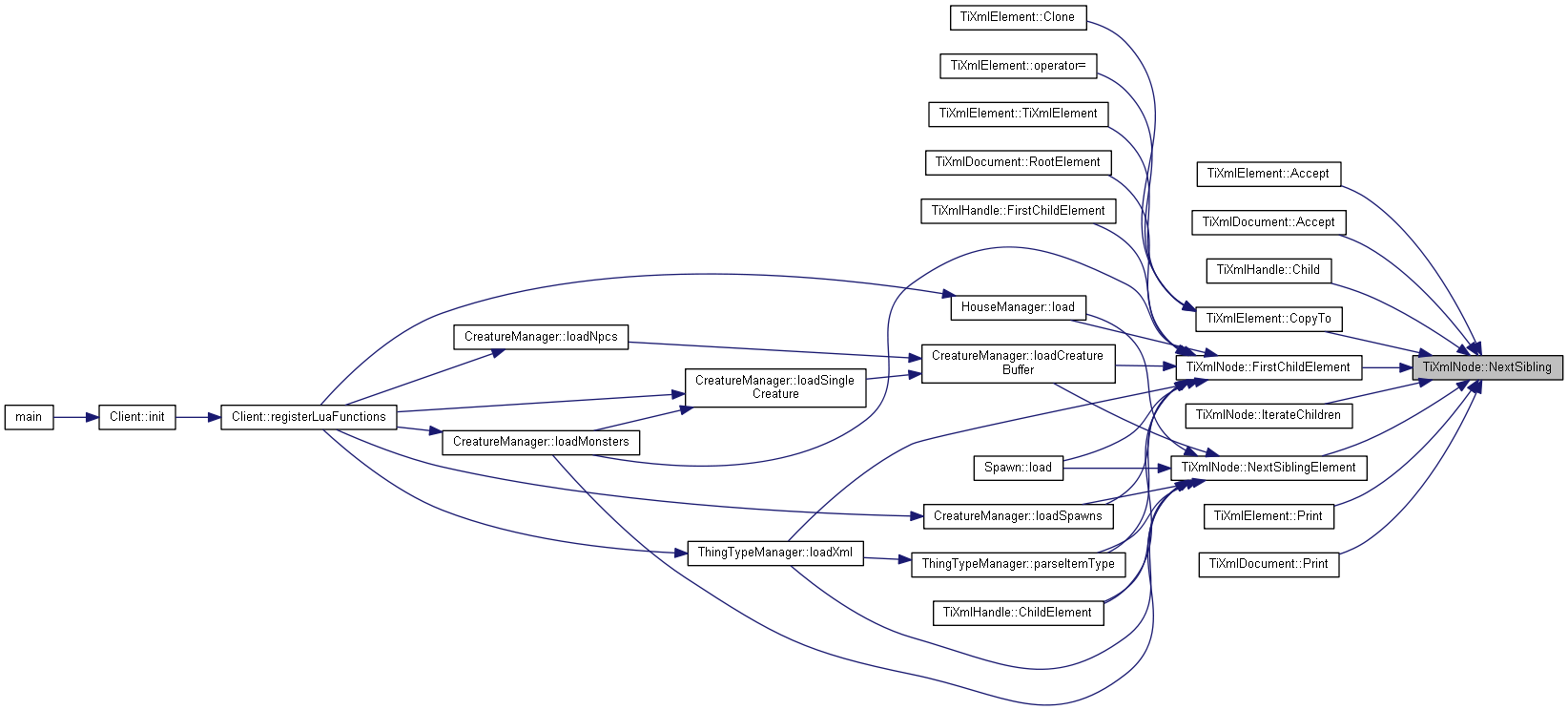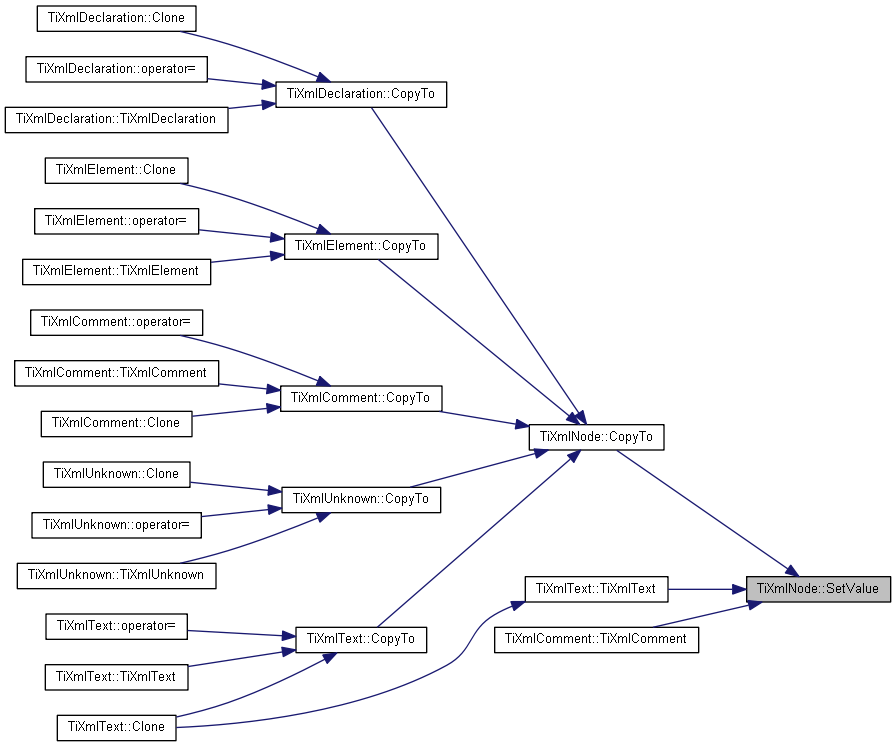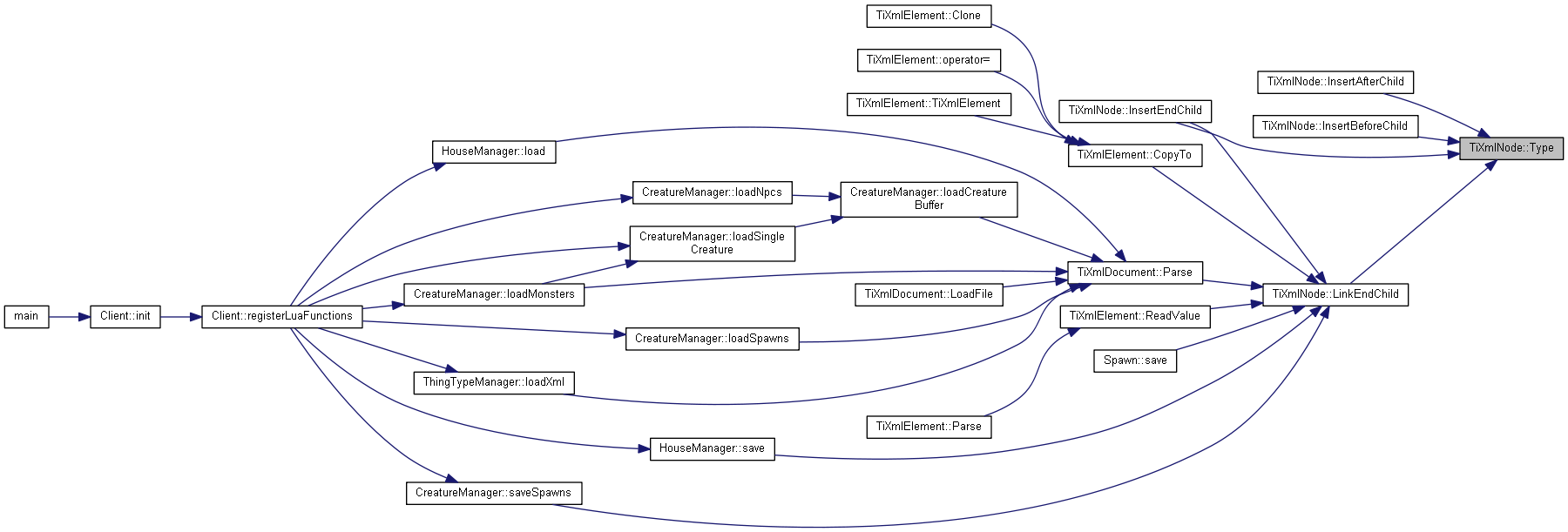#include <tinyxml.h>

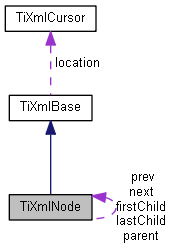
Public Member Functions | |
| TiXmlNode (const TiXmlNode &)=delete | |
| void | operator= (const TiXmlNode &base)=delete |
| virtual | ~TiXmlNode () |
| const char * | Value () const |
| const std::string & | ValueStr () const |
| const TIXML_STRING & | ValueTStr () const |
| void | SetValue (const char *_value) |
| void | SetValue (const std::string &_value) |
| STL std::string form. More... | |
| void | Clear () |
| Delete all the children of this node. Does not affect 'this'. More... | |
| TiXmlNode * | Parent () |
| One step up the DOM. More... | |
| const TiXmlNode * | Parent () const |
| TiXmlNode * | FirstChild () |
| const TiXmlNode * | FirstChild (const char *value) const |
| TiXmlNode * | FirstChild (const char *_value) |
| The first child of this node with the matching 'value'. Will be null if none found. More... | |
| const TiXmlNode * | LastChild () const |
| TiXmlNode * | LastChild () |
| The last child of this node. Will be null if there are no children. More... | |
| const TiXmlNode * | LastChild (const char *value) const |
| TiXmlNode * | LastChild (const char *_value) |
| The last child of this node matching 'value'. Will be null if there are no children. More... | |
| const TiXmlNode * | IterateChildren (const TiXmlNode *previous) const |
| TiXmlNode * | IterateChildren (const TiXmlNode *previous) |
| const TiXmlNode * | IterateChildren (const char *value, const TiXmlNode *previous) const |
| This flavor of IterateChildren searches for children with a particular 'value'. More... | |
| TiXmlNode * | IterateChildren (const char *_value, const TiXmlNode *previous) |
| TiXmlNode * | InsertEndChild (const TiXmlNode &addThis) |
| TiXmlNode * | LinkEndChild (TiXmlNode *addThis) |
| TiXmlNode * | InsertBeforeChild (TiXmlNode *beforeThis, const TiXmlNode &addThis) |
| TiXmlNode * | InsertAfterChild (TiXmlNode *afterThis, const TiXmlNode &addThis) |
| TiXmlNode * | ReplaceChild (TiXmlNode *replaceThis, const TiXmlNode &withThis) |
| bool | RemoveChild (TiXmlNode *removeThis) |
| Delete a child of this node. More... | |
| const TiXmlNode * | PreviousSibling () const |
| Navigate to a sibling node. More... | |
| TiXmlNode * | PreviousSibling () |
| const TiXmlNode * | PreviousSibling (const char *) const |
| Navigate to a sibling node. More... | |
| TiXmlNode * | PreviousSibling (const char *_prev) |
| const TiXmlNode * | NextSibling () const |
| Navigate to a sibling node. More... | |
| TiXmlNode * | NextSibling () |
| const TiXmlNode * | NextSibling (const char *) const |
| Navigate to a sibling node with the given 'value'. More... | |
| TiXmlNode * | NextSibling (const char *_next) |
| const TiXmlElement * | NextSiblingElement () const |
| TiXmlElement * | NextSiblingElement () |
| const TiXmlElement * | NextSiblingElement (const char *) const |
| TiXmlElement * | NextSiblingElement (const char *_next) |
| const TiXmlElement * | FirstChildElement () const |
| Convenience function to get through elements. More... | |
| TiXmlElement * | FirstChildElement () |
| const TiXmlElement * | FirstChildElement (const char *_value) const |
| Convenience function to get through elements. More... | |
| TiXmlElement * | FirstChildElement (const char *_value) |
| int | Type () const |
| const TiXmlDocument * | GetDocument () const |
| TiXmlDocument * | GetDocument () |
| bool | NoChildren () const |
| Returns true if this node has no children. More... | |
| virtual TiXmlNode * | Clone () const =0 |
| virtual bool | Accept (TiXmlVisitor *visitor) const =0 |
 Public Member Functions inherited from TiXmlBase Public Member Functions inherited from TiXmlBase | |
| TiXmlBase (const TiXmlBase &)=delete | |
| void | operator= (const TiXmlBase &base)=delete |
| TiXmlBase () | |
| virtual | ~TiXmlBase () |
| virtual void | Print (FILE *cfile, int depth) const =0 |
| int | Row () const |
| virtual const char * | Parse (const char *p, TiXmlParsingData *data, TiXmlEncoding encoding)=0 |
Protected Member Functions | |
| TiXmlNode (NodeType _type) | |
| void | CopyTo (TiXmlNode *target) const |
| virtual void | StreamIn (std::istream *in, TIXML_STRING *tag)=0 |
| TiXmlNode * | Identify (const char *start, TiXmlEncoding encoding) |
Protected Attributes | |
| TiXmlNode * | parent |
| NodeType | type |
| TiXmlNode * | firstChild |
| TiXmlNode * | lastChild |
| TIXML_STRING | value |
| TiXmlNode * | prev |
| TiXmlNode * | next |
 Protected Attributes inherited from TiXmlBase Protected Attributes inherited from TiXmlBase | |
| TiXmlCursor | location |
| void * | userData |
| Field containing a generic user pointer. More... | |
Friends | |
| class | TiXmlDocument |
| class | TiXmlElement |
| std::istream & | operator>> (std::istream &in, TiXmlNode &base) |
| std::ostream & | operator<< (std::ostream &out, const TiXmlNode &base) |
| std::string & | operator<< (std::string &out, const TiXmlNode &base) |
| Appends the XML node or attribute to a std::string. More... | |
Additional Inherited Members | |
 Static Public Member Functions inherited from TiXmlBase Static Public Member Functions inherited from TiXmlBase | |
| static void | SetCondenseWhiteSpace (bool condense) |
| static bool | IsWhiteSpaceCondensed () |
| Return the current white space setting. More... | |
| static void | EncodeString (const TIXML_STRING &str, TIXML_STRING *out) |
 Static Public Attributes inherited from TiXmlBase Static Public Attributes inherited from TiXmlBase | |
| static const int | utf8ByteTable [256] |
 Static Protected Member Functions inherited from TiXmlBase Static Protected Member Functions inherited from TiXmlBase | |
| static const char * | SkipWhiteSpace (const char *, TiXmlEncoding encoding) |
| static bool | IsWhiteSpace (char c) |
| static bool | IsWhiteSpace (int c) |
| static bool | StreamWhiteSpace (std::istream *in, TIXML_STRING *tag) |
| static bool | StreamTo (std::istream *in, int character, TIXML_STRING *tag) |
| static const char * | ReadName (const char *p, TIXML_STRING *name, TiXmlEncoding encoding) |
| static const char * | ReadText (const char *in, TIXML_STRING *text, bool ignoreWhiteSpace, const char *endTag, bool ignoreCase, TiXmlEncoding encoding) |
| static const char * | GetEntity (const char *in, char *value, int *length, TiXmlEncoding encoding) |
| static const char * | GetChar (const char *p, char *_value, int *length, TiXmlEncoding encoding) |
| static bool | StringEqual (const char *p, const char *endTag, bool ignoreCase, TiXmlEncoding encoding) |
| static int | IsAlpha (unsigned char anyByte, TiXmlEncoding encoding) |
| static int | IsAlphaNum (unsigned char anyByte, TiXmlEncoding encoding) |
| static int | ToLower (int v, TiXmlEncoding encoding) |
| static void | ConvertUTF32ToUTF8 (unsigned long input, char *output, int *length) |
 Static Protected Attributes inherited from TiXmlBase Static Protected Attributes inherited from TiXmlBase | |
| static const char * | errorString [TIXML_ERROR_STRING_COUNT] |
Detailed Description
The parent class for everything in the Document Object Model. (Except for attributes). Nodes have siblings, a parent, and children. A node can be in a document, or stand on its own. The type of a TiXmlNode can be queried, and it can be cast to its more defined type.
Member Enumeration Documentation
◆ NodeType
| enum TiXmlNode::NodeType |
Constructor & Destructor Documentation
◆ TiXmlNode() [1/2]
|
delete |
◆ ~TiXmlNode()
|
virtual |
Definition at line 147 of file tinyxml.cpp.
◆ TiXmlNode() [2/2]
|
protected |
Definition at line 136 of file tinyxml.cpp.
Member Function Documentation
◆ Accept()
|
pure virtual |
Accept a hierchical visit the nodes in the TinyXML DOM. Every node in the XML tree will be conditionally visited and the host will be called back via the TiXmlVisitor interface.
This is essentially a SAX interface for TinyXML. (Note however it doesn't re-parse the XML for the callbacks, so the performance of TinyXML is unchanged by using this interface versus any other.)
The interface has been based on ideas from:
Which are both good references for "visiting".
An example of using Accept():
TiXmlPrinter printer; tinyxmlDoc.Accept( &printer ); const char* xmlcstr = printer.CStr();
Implemented in TiXmlDeclaration, TiXmlComment, TiXmlElement, TiXmlDocument, TiXmlUnknown, and TiXmlText.

◆ Clear()
| void TiXmlNode::Clear | ( | ) |
Delete all the children of this node. Does not affect 'this'.
Definition at line 169 of file tinyxml.cpp.
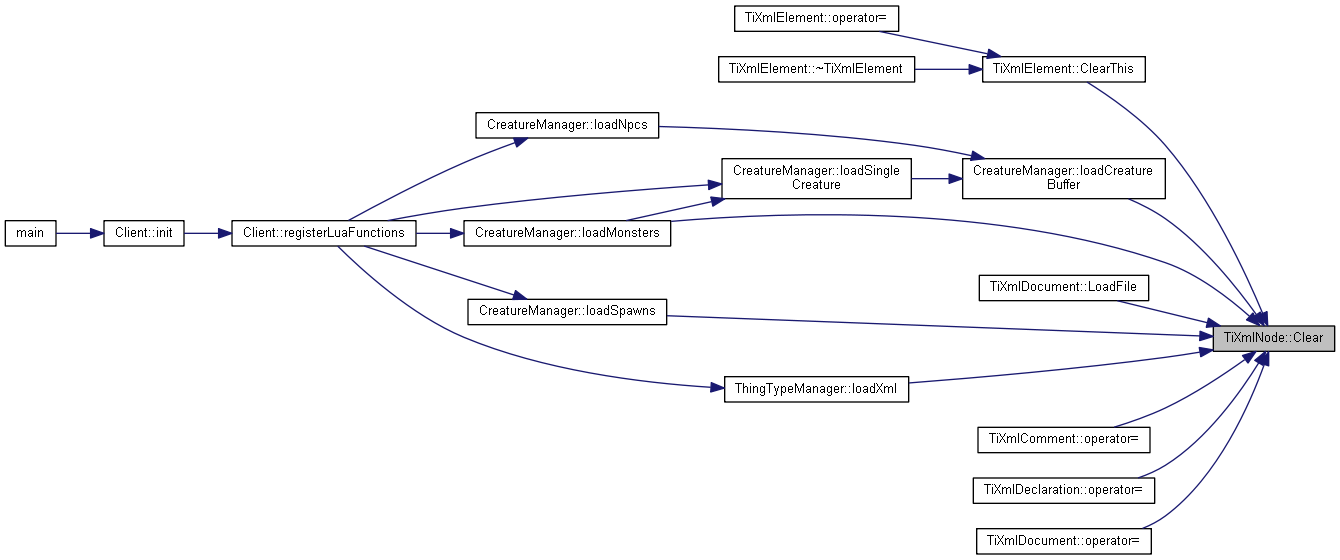
◆ Clone()
|
pure virtual |
Create an exact duplicate of this node and return it. The memory must be deleted by the caller.
Implemented in TiXmlDocument, TiXmlUnknown, TiXmlDeclaration, TiXmlText, TiXmlComment, and TiXmlElement.
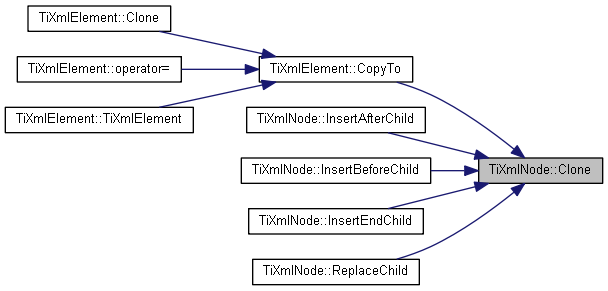
◆ CopyTo()
|
protected |
Definition at line 161 of file tinyxml.cpp.

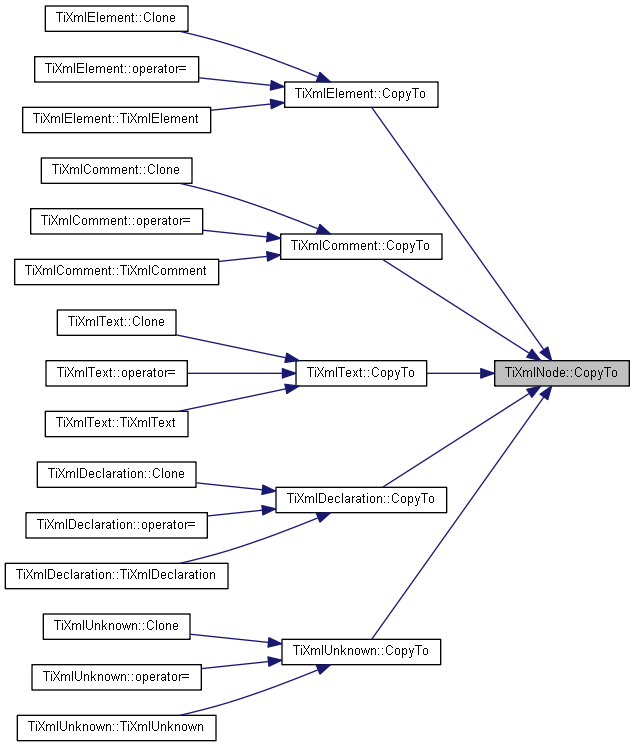
◆ FirstChild() [1/3]
|
inline |
◆ FirstChild() [2/3]
|
inline |
◆ FirstChild() [3/3]
| const TiXmlNode * TiXmlNode::FirstChild | ( | const char * | value | ) | const |
The first child of this node with the matching 'value'. Will be null if none found.
Definition at line 361 of file tinyxml.cpp.

◆ FirstChildElement() [1/4]
|
inline |
◆ FirstChildElement() [2/4]
| const TiXmlElement * TiXmlNode::FirstChildElement | ( | ) | const |
Convenience function to get through elements.
Definition at line 446 of file tinyxml.cpp.

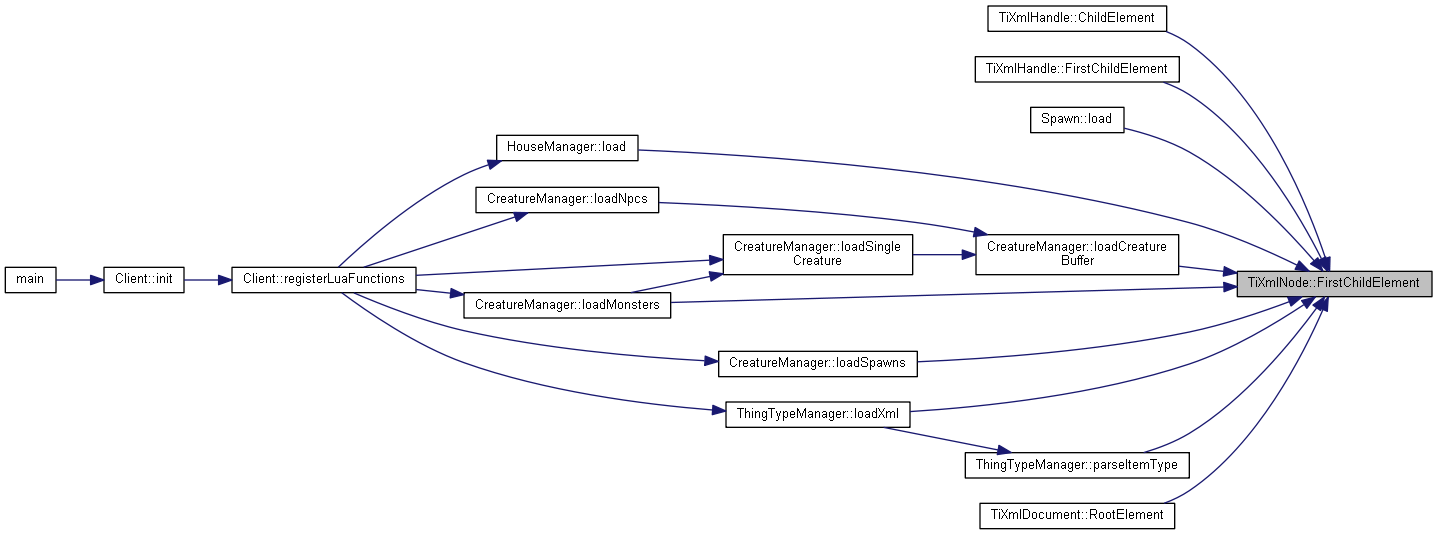
◆ FirstChildElement() [3/4]
|
inline |
◆ FirstChildElement() [4/4]
| const TiXmlElement * TiXmlNode::FirstChildElement | ( | const char * | _value | ) | const |
Convenience function to get through elements.
Definition at line 461 of file tinyxml.cpp.

◆ GetDocument() [1/2]
|
inline |
◆ GetDocument() [2/2]
| const TiXmlDocument * TiXmlNode::GetDocument | ( | ) | const |
Return a pointer to the Document this node lives in. Returns null if not in a document.
Definition at line 506 of file tinyxml.cpp.
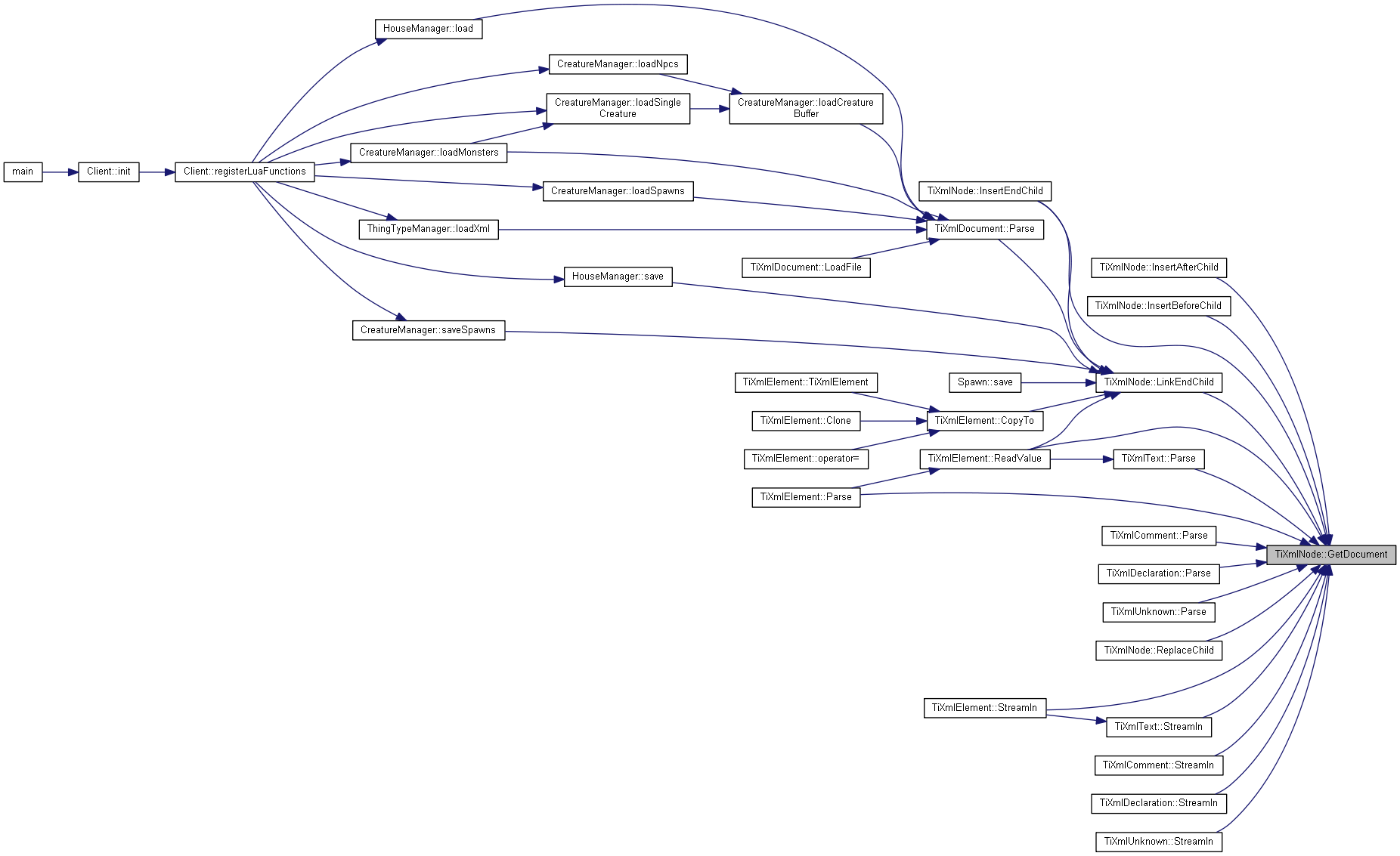
◆ Identify()
|
protected |
Definition at line 822 of file tinyxmlparser.cpp.


◆ InsertAfterChild()
Add a new node related to this. Adds a child after the specified child. Returns a pointer to the new object or NULL if an error occured.
Definition at line 263 of file tinyxml.cpp.

◆ InsertBeforeChild()
Add a new node related to this. Adds a child before the specified child. Returns a pointer to the new object or NULL if an error occured.
Definition at line 230 of file tinyxml.cpp.

◆ InsertEndChild()
Add a new node related to this. Adds a child past the LastChild. Returns a pointer to the new object or NULL if an error occured.
Definition at line 214 of file tinyxml.cpp.

◆ IterateChildren() [1/4]
◆ IterateChildren() [2/4]
| const TiXmlNode * TiXmlNode::IterateChildren | ( | const char * | value, |
| const TiXmlNode * | previous | ||
| ) | const |
This flavor of IterateChildren searches for children with a particular 'value'.
Definition at line 399 of file tinyxml.cpp.

◆ IterateChildren() [3/4]
◆ IterateChildren() [4/4]
An alternate way to walk the children of a node. One way to iterate over nodes is:
for( child = parent->FirstChild(); child; child = child->NextSibling() )
IterateChildren does the same thing with the syntax:
child = 0;
while( child = parent->IterateChildren( child ) )
IterateChildren takes the previous child as input and finds the next one. If the previous child is null, it returns the first. IterateChildren will return null when done.
Definition at line 385 of file tinyxml.cpp.

◆ LastChild() [1/4]
|
inline |
◆ LastChild() [2/4]
|
inline |
◆ LastChild() [3/4]
|
inline |
◆ LastChild() [4/4]
| const TiXmlNode * TiXmlNode::LastChild | ( | const char * | value | ) | const |
◆ LinkEndChild()
Add a new node related to this. Adds a child past the LastChild.
NOTE: the node to be added is passed by pointer, and will be henceforth owned (and deleted) by tinyXml. This method is efficient and avoids an extra copy, but should be used with care as it uses a different memory model than the other insert functions.
- See also
- InsertEndChild
Definition at line 186 of file tinyxml.cpp.

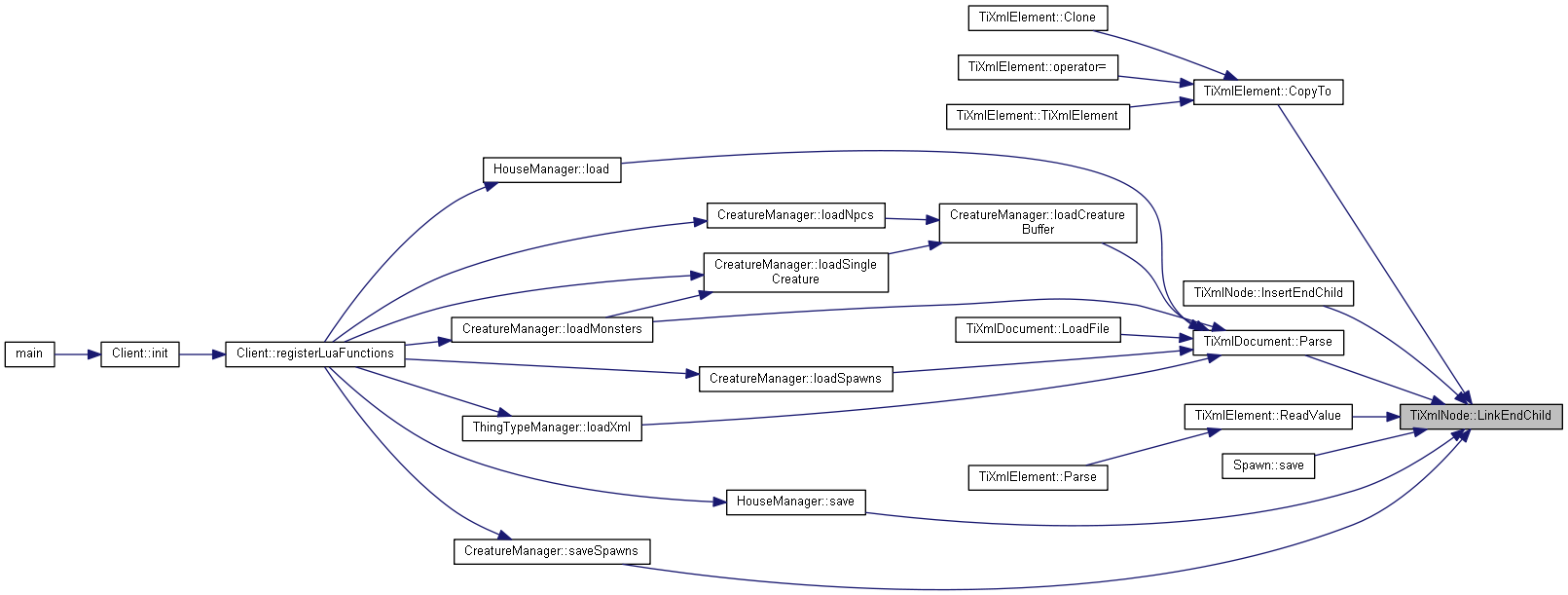
◆ NextSibling() [1/4]
◆ NextSibling() [2/4]
|
inline |
◆ NextSibling() [3/4]
| const TiXmlNode * TiXmlNode::NextSibling | ( | const char * | _value | ) | const |
Navigate to a sibling node with the given 'value'.
Definition at line 413 of file tinyxml.cpp.

◆ NextSibling() [4/4]
|
inline |
◆ NextSiblingElement() [1/4]
|
inline |
◆ NextSiblingElement() [2/4]
| const TiXmlElement * TiXmlNode::NextSiblingElement | ( | ) | const |
Convenience function to get through elements. Calls NextSibling and ToElement. Will skip all non-Element nodes. Returns 0 if there is not another element.
Definition at line 476 of file tinyxml.cpp.


◆ NextSiblingElement() [3/4]
| const TiXmlElement * TiXmlNode::NextSiblingElement | ( | const char * | _value | ) | const |
Convenience function to get through elements. Calls NextSibling and ToElement. Will skip all non-Element nodes. Returns 0 if there is not another element.
Definition at line 491 of file tinyxml.cpp.

◆ NextSiblingElement() [4/4]
|
inline |
◆ NoChildren()
|
inline |
◆ operator=()
|
delete |
◆ Parent() [1/2]
|
inline |
◆ Parent() [2/2]
◆ PreviousSibling() [1/4]
◆ PreviousSibling() [2/4]
|
inline |
◆ PreviousSibling() [3/4]
| const TiXmlNode * TiXmlNode::PreviousSibling | ( | const char * | _value | ) | const |
Navigate to a sibling node.
Definition at line 425 of file tinyxml.cpp.

◆ PreviousSibling() [4/4]
|
inline |
◆ RemoveChild()
| bool TiXmlNode::RemoveChild | ( | TiXmlNode * | removeThis | ) |
Delete a child of this node.
Definition at line 335 of file tinyxml.cpp.
◆ ReplaceChild()
Replace a child of this node. Returns a pointer to the new object or NULL if an error occured.
Definition at line 296 of file tinyxml.cpp.

◆ SetValue() [1/2]
|
inline |
◆ SetValue() [2/2]
|
inline |
◆ StreamIn()
|
protectedpure virtual |
Implemented in TiXmlDocument, TiXmlUnknown, TiXmlDeclaration, TiXmlText, TiXmlComment, and TiXmlElement.

◆ Type()
|
inline |
◆ Value()
|
inline |
The meaning of 'value' changes for the specific type of TiXmlNode.
Document: filename of the xml file Element: name of the element Comment: the comment text Unknown: the tag contents Text: the text string
The subclasses will wrap this function.
Definition at line 494 of file tinyxml.h.
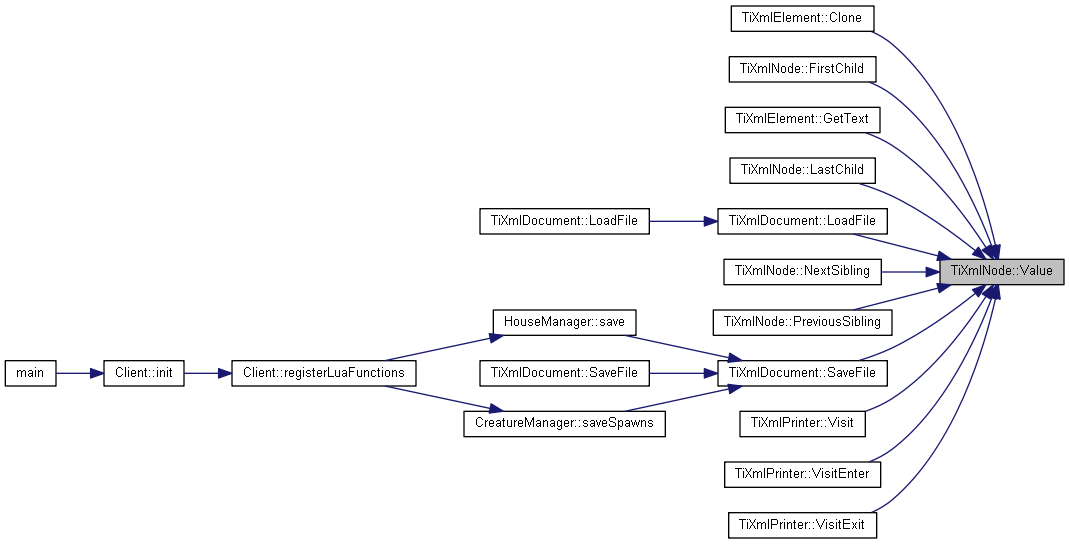
◆ ValueStr()
|
inline |
◆ ValueTStr()
|
inline |
Friends And Related Function Documentation
◆ operator<< [1/2]
|
friend |
An output stream operator, for every class. Note that this outputs without any newlines or formatting, as opposed to Print(), which includes tabs and new lines.
The operator<< and operator>> are not completely symmetric. Writing a node to a stream is very well defined. You'll get a nice stream of output, without any extra whitespace or newlines.
But reading is not as well defined. (As it always is.) If you create a TiXmlElement (for example) and read that from an input stream, the text needs to define an element or junk will result. This is true of all input streams, but it's worth keeping in mind.
A TiXmlDocument will read nodes until it reads a root element, and all the children of that root element.
Definition at line 1412 of file tinyxml.cpp.
◆ operator<< [2/2]
|
friend |
Appends the XML node or attribute to a std::string.
Definition at line 1423 of file tinyxml.cpp.
◆ operator>>
|
friend |
An input stream operator, for every class. Tolerant of newlines and formatting, but doesn't expect them.
Definition at line 1399 of file tinyxml.cpp.
◆ TiXmlDocument
|
friend |
◆ TiXmlElement
|
friend |
Member Data Documentation
◆ firstChild
◆ lastChild
◆ next
◆ parent
◆ prev
◆ type
◆ value
|
protected |
The documentation for this class was generated from the following files:
- src/framework/xml/tinyxml.h
- src/framework/xml/tinyxml.cpp
- src/framework/xml/tinyxmlparser.cpp
